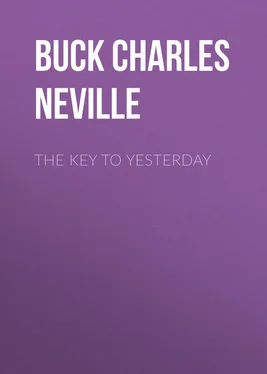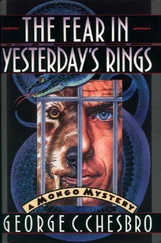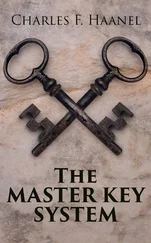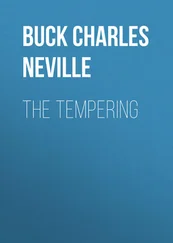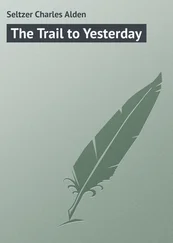Charles Buck - The Key to Yesterday
Здесь есть возможность читать онлайн «Charles Buck - The Key to Yesterday» — ознакомительный отрывок электронной книги совершенно бесплатно, а после прочтения отрывка купить полную версию. В некоторых случаях можно слушать аудио, скачать через торрент в формате fb2 и присутствует краткое содержание. ISBN: , Жанр: foreign_prose, foreign_antique, foreign_language, на английском языке. Описание произведения, (предисловие) а так же отзывы посетителей доступны на портале библиотеки ЛибКат.
- Название:The Key to Yesterday
- Автор:
- Жанр:
- Год:неизвестен
- ISBN:http://www.gutenberg.org/ebooks/33759
- Рейтинг книги:3 / 5. Голосов: 1
-
Избранное:Добавить в избранное
- Отзывы:
-
Ваша оценка:
- 60
- 1
- 2
- 3
- 4
- 5
The Key to Yesterday: краткое содержание, описание и аннотация
Предлагаем к чтению аннотацию, описание, краткое содержание или предисловие (зависит от того, что написал сам автор книги «The Key to Yesterday»). Если вы не нашли необходимую информацию о книге — напишите в комментариях, мы постараемся отыскать её.
The Key to Yesterday — читать онлайн ознакомительный отрывок
Ниже представлен текст книги, разбитый по страницам. Система сохранения места последней прочитанной страницы, позволяет с удобством читать онлайн бесплатно книгу «The Key to Yesterday», без необходимости каждый раз заново искать на чём Вы остановились. Поставьте закладку, и сможете в любой момент перейти на страницу, на которой закончили чтение.
Интервал:
Закладка:
The raconteur halted in his narrative.
“Please go on,” begged Duska, in a low voice. “What happened?”
The foreigner smiled.
“They fired.” Then, as he saw the slight shudder of Duska’s white shoulder, he supplemented: “But each soldier had left the task for the others… Possibly, they sympathized with him; possibly, they sympathized with the revolution; possibly, each of the six secretly calculated that the other five would be sufficient. Quien sabe? At all events, he fell only slightly wounded. One bullet – ” he spoke thoughtfully, letting his eyes drop from Saxon’s face to the table-cloth where Saxon’s right hand lay – “one bullet pierced his right hand from back to front.”
Then, a half-whimsical smile crossed Ribero’s somewhat saturnine features, for Miss Filson had dropped her napkin on Saxon’s side, and, when the painter had stooped to recover it, he did not again replace the hand on the table.
“Before he could be fired on a second time,” concluded the diplomat with a shrug, “a new presidente was on his way to the palace. Your countryman was saved.”
If the hero of Ribero’s narrative was a malefactor, at least he was a malefactor with the sympathy of Mr. Bellton’s dinner-party, as was attested by a distinctly audible sigh of relief at the end of the story. But Señor Ribero was not quite through.
“It is not, after all, the story that discredits your countryman,” he explained, “but the sequel. Of course, he became powerful in the new régime. It was when he was lauded as a national hero that his high fortunes intoxicated him, and success rotted his moral fiber. Eventually, he embezzled a fortune from the government which he had assisted to establish. There was also a matter of – how shall I say? – of a lady. Then, a duel which was really an assassination. He escaped with blood on his conscience, presumably to enjoy his stolen wealth in his own land.”
“I have often wondered,” pursued Ribero, “whether, if that man and I should ever be thrown together again, he would know me … and I have often wished I could remember him only as the brave adventurer – not also as the criminal.”
As he finished, the speaker was holding Saxon with his eyes, and had a question in his glance that seemed to call for some expression from the other. Saxon bowed with a smile.
“It is an engrossing story.”
“I think,” said Duska suddenly, almost critically, “the first part was so good that it was a pity to spoil it with the rest.”
Señor Ribero smiled enigmatically into his wine-glass.
“I fear, señorita, that is the sad difference between fiction and history. My tale is a true one.”
“At all events,” continued the girl with vigor, “he was a brave man. That is enough to remember. I think it is better to forget the rest.”
It seemed to Ribero that the glance Saxon flashed on her was almost the glance of gratitude.
“What was his name?” she suddenly demanded.
“He called himself – at that time – George Carter,” Ribero said slowly, “but gentlemen in the unrecognized pursuits quite frequently have occasion to change their names. Now, it is probably something else.”
After the dinner had ended, while the guests fell into groups or waited for belated carriages, Saxon found himself standing apart, near the window. It was open on the balcony, and the man felt a sudden wish for the quiet freshness of the outer air on his forehead. He drew back the curtain, and stepped across the low sill, then halted as he realized that he was not alone.
The sputtering arc-light swinging over the street made the intervening branches and leaves of the sidewalk sycamores stand out starkly black, like a ragged drop hung over a stage.
The May moon was only a thin sickle, and the other figure on the darkly shadowed balcony was vaguely defined, but Saxon at once recognized, in its lithe slenderness and grace of pose, Miss Filson.
“I didn’t mean to intrude,” he hastily apologized. “I didn’t know you were here.”
She laughed. “Would that have frightened you?” she asked.
She was leaning on the iron rail, and the man took his place at her side.
“I came with the Longmores,” she explained, “and their machine hasn’t come yet. It’s cool here – and I was thinking – ”
“You weren’t by any chance thinking of Babylon?” he laughed, “or Macedonia?”
She shook her head. “Mr. Ribero’s story sticks in my mind. It was so personal, and – I guess I’m a moody creature. Anyway, I find myself thinking of it.”
There was silence for a space, except for the laughter that floated up from the verandah below them, where a few of the members sat smoking, and the softened clicking of ivory from the open windows of the billiard-room. The painter’s fingers, resting on the iron rail, closed over a tendril of clambering moon-flower vine, and nervously twisted the stem.
With an impulsive movement, he leaned forward. His voice was eager.
“Suppose,” he questioned, “suppose you knew such a man – can you imagine any circumstances under which you could make excuses for him?”
She stood a moment weighing the problem. “It’s a hard question,” she replied finally, then added impulsively: “Do you know, I’m afraid I’m a terrible heathen? I can excuse so much where there is courage – the cold sort of chilled-steel courage that he had. What do you think?”
The painter drew his handkerchief from his pocket, and wiped his moist forehead, but, before he could frame his answer, the girl heard a movement in the room, and turned lightly to join her chaperon.
Following her, Saxon found himself saying good-night to a group that included Ribero. As the attaché shook hands, he held Saxon’s somewhat longer than necessary, seeming to glance at a ring, but really studying a scar.
“You are a good story-teller, Mr. Ribero,” said Saxon, quietly.
“Ah,” countered the other quickly, “but that is easy, señor, where one has so good a listener. By the way, señor, did you ever chance to visit Puerto Frio?”
The painter shook his head.
“Not unless in some other life – some life as dead as that of the pharaohs.”
“Ah, well – ” the diplomat turned away, still smiling – “some of the pharaohs are remarkably well preserved.”
CHAPTER IV
Steele himself had not been a failure at his art. There was in him no want of that sensitive temperament and dream-fire which gives the artist, like the prophet, a better sight and deeper appreciation than is accorded the generality. The only note missing was the necessity for hard application, which might have made him the master where he was satisfied to be the dilettante. The extreme cleverness of his brush had at the outset been his handicap, lulling the hard sincerity of effort with too facile results. Wealth, too, had drugged his energies, but had not crippled his abilities. If he drifted, it was because drifting in smooth seas is harmless and pleasant, not because he was unseaworthy or fearful of stormier conditions. In Saxon, he had not only recognized a greater genius, but found a friend, and with the insouciance of a graceful philosophy he reasoned it out to his own contentment. Each craft after its own uses! Saxon was meant for a greater commerce. His genius was intended to be an argosy, bearing rich cargo between the ports of the gods and those of men. If, in the fulfillment of that destiny, the shallop of his own lesser talent and influence might act as convoy and guide, luring the greater craft into wider voyaging, he would be satisfied. Just now, that guidance ought to be away from the Marston influence where lay ultimate danger and limitation. He was glad that where people discussed Frederick Marston they also discussed his foremost disciple. Marston himself had loomed large in the star-chart of painting only a dozen years ago, and was now the greatest of luminaries. His follower had been known less than half that long. If he were to surpass the man he was now content to follow, he must break away from Marston-worship and let his maturer efforts be his own – his ultimate style his own. Prophets and artists have from the beginning of time arisen from second place to a preëminent first – pupils have surpassed their teachers. He had hoped that these months in a new type of country and landscape would slowly, almost insensibly, wean Saxon away from the influence that had made his greatness and now in turn threatened to limit its scope.
Читать дальшеИнтервал:
Закладка:
Похожие книги на «The Key to Yesterday»
Представляем Вашему вниманию похожие книги на «The Key to Yesterday» списком для выбора. Мы отобрали схожую по названию и смыслу литературу в надежде предоставить читателям больше вариантов отыскать новые, интересные, ещё непрочитанные произведения.
Обсуждение, отзывы о книге «The Key to Yesterday» и просто собственные мнения читателей. Оставьте ваши комментарии, напишите, что Вы думаете о произведении, его смысле или главных героях. Укажите что конкретно понравилось, а что нет, и почему Вы так считаете.
